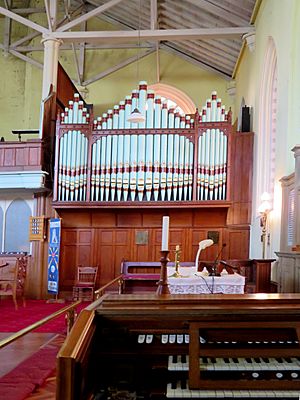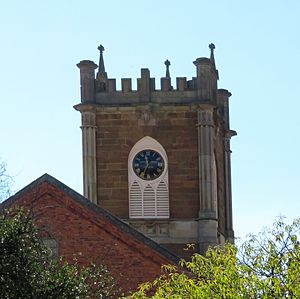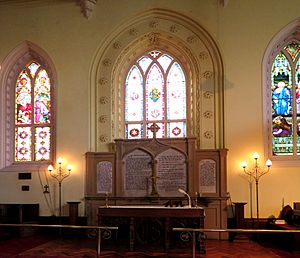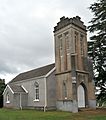St John's Anglican Church, New Town facts for kids
Quick facts for kids St John's Anglican Church, New Town |
|
|---|---|
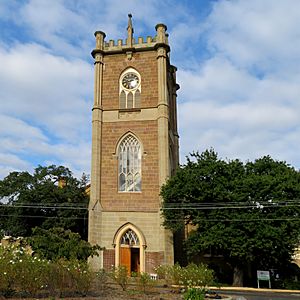 |
|
| 42°51′17″S 147°17′50″E / 42.8548°S 147.2971°E | |
| Location | 14 St John's Avenue, New Town, Tasmania |
| Country | Australia |
| Denomination | Anglican |
| History | |
| Founded | 6 January 1834 |
| Consecrated | 29 May 1838 |
| Architecture | |
| Architect(s) | John Lee Archer |
| Architectural type | Gothic Revival |
| Groundbreaking | 1834 |
| Completed | 1835 |
| Specifications | |
| Materials | Convict bricks and sandstone ? |
| Administration | |
| Parish | St John's New Town |
| Diocese | Anglican Diocese of Tasmania |
St John's Anglican Church is a very old church in New Town, Tasmania, Australia. It's special because people have used it for church services without stopping since December 20, 1835! It's part of the Anglican Church in Tasmania.
A talented architect named John Lee Archer designed the church. He worked for the Tasmanian government and came from Dublin, Ireland. The church was built by people who were living in Tasmania at the time.
Because it's over 180 years old, the church has many interesting features. These features show us what life was like in Hobart in the 1800s and 1900s.
Contents
The Church's Story
In 1830, there were plans to build a special school and a small church in New Town. This school was for children whose parents were convicts or Aboriginal people. It also helped young people who had broken rules.
The governor of Tasmania, George Arthur, decided to make the small church bigger. He wanted it to be a main church for the whole area. Money for the church came from donations.
The church was built right between the boys' and girls' sections of the school. This meant the church was used by the school children, convicts, and other settlers. The children sat in one special area, and the convicts sat in another. Settlers sat in the main part of the church. There were even barriers and separate doors so the children couldn't see the convicts.
People who were living in Tasmania at the time built the church. They made the bricks by hand for the walls. They also cut stone for the tower and timber beams from trees on nearby Mount Wellington. The church was ready enough for its first service on December 20, 1835.
Cool Features of the Church
The outside and inside of St John's Church have many interesting things to see. They are important for both architecture and history.
In the 1850s, the church used whale oil to light its lamps. This was very modern back then! Today, whales are protected by Australian law, so this would not happen.
The Pipe Organ
The church's organ is a musical instrument that has changed over many years. The first organ was made in London. It was later sold, and a new one was built in 1901. This organ was rebuilt several times, in 1955 and again in 1977-78. Each time, new parts were added or changed to make the music sound even better.
Clock and Bell
The church tower is made of stone and has a simple, pointed Gothic style. It has a cool top with battlements and octagonal pillars. It's a very nice tower!
On all four sides of the tower, there is a clock that still chimes the hours. This clock is even older than Big Ben! It was made in London in 1818. The clock's bell was a special gift from the English king, William IV, in 1834.
The first bell had to be taken down in 1916 because it wasn't safe anymore. It was melted down and made into special medallions. A new bell was put in place in 1929. All the churches in the area helped pay for this new bell.
In 1978, the clock's face was fixed up. It now has its original gold Roman numbers on a black background.
The Pulpit
The pulpit, where the priest speaks, was made from special cedar wood brought from other countries. It was designed to be very tall, about four metres (over 13 feet) high, with three levels. Today, only the top level remains. You can see a drawing of what it looked like originally in the church's pamphlet.
Seating and Galleries
The first seats, called pews, were also made from imported cedar wood. They were tall, box-like seats that faced a central aisle. These seats were for the regular church members. The children from the school and the convicts had to sit in separate areas called the North Gallery and South Gallery. These areas were very plain and kept completely separate.
The Narthex
There is a small side-chapel called the Narthex. It was dedicated on April 26, 1987. This was done to remember Margaret Anne Hemsley, who was a much-loved member of the church and helped the community a lot.
Catherine Latta Gallery
A room in the church is set aside to keep and show documents and photos about the church's history. This room is dedicated to Catherine Latta, remembering her contributions.
The Graveyard
There used to be two cemeteries on the church grounds until the 1870s. One was for Anglicans and one for Catholics. Children from the orphan schools were buried here. It was also the cemetery for other people living in New Town. In the 1960s, the gravestones were moved, and many went to Cornelian Bay.
Other Anglican Churches in Tasmania


